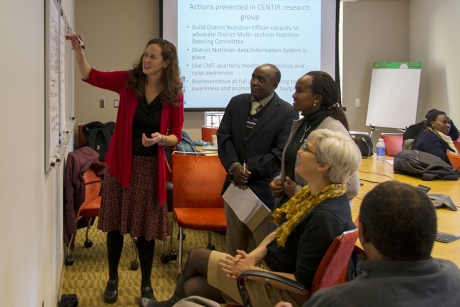Researchers in Tanzania scale up nutrition knowledge for local level nutrition interventions
From 19-30 October 2015, researchers from five institutions gathered for the second phase of a project to improve life-saving nutrition interventions and education at the local level in Tanzania. The first phase of the partnership, held in 2014, assessed the nutrition knowledge held by community…

Jeanne Moseley, Luitfrid Nnally, Clara Mollay, Rebecca Stoltzfus and Rune Philemon brainstorm potential goals for community nutrition in rural Tanzania during workshops with Cornell Division of Nutritional Sciences faculty members and researchers on Cornell’s campus. PHOTO: Mark Vorreuter/College of Human Ecology
From 19-30 October 2015, researchers from five institutions gathered for the second phase of a project to improve life-saving nutrition interventions and education at the local level in Tanzania.
The first phase of the partnership, held in 2014, assessed the nutrition knowledge held by community and district level medical and educational staff and others in several Tanzanian communities. The second phase looked at developing an innovative nutrition curriculum and the best ways to implement it for Tanzanian nutrition workers and others in 2016.
“At the national policy level, Tanzania is a very good example of having a very forward-looking, national nutrition strategy where nutrition is seen as being very much a part of the development agenda, food security, healthy diets, infant feeding and good nutrition for mothers … but when we went down to the grassroots level, we found this big gap and lack of understanding.” – Rebecca Stoltzfus, Cornell nutritional sciences professor and director of the Global Health Program in the College of Human Ecology.
The collaborative project titled “Building Strong Nutrition systems: Implementation Science in support of Scaling Up Nutrition” is funded by a grant from the Bill & Melinda Gates Foundation. Cornell nutritional sciences professor Rebecca Stoltzfus is the co-principal investigator on the project along with Mary Mosha, a lecturer in the Department of Community Health at Kilimanjaro Christian Medical University College.
The program’s strategy depends on the “scaling-up nutrition” (SUN) model: training a sustainable, in-country workforce at the community level in nutrition education and effective interventions.
Currently, project leaders say, weaknesses in the capacity to deliver high-quality nutrition interventions at scale in Tanzania affect the health and well-being of 7.3 million children and 10.9 million women of reproductive age and, consequently, the social and economic development of the nation.
Participating Tanzanian institutions are the Tanzania Food and Nutrition Center and four universities: Kilimanjaro Christian Medical University College, Sokoine University of Agriculture, Muhimbili University of Health and Allied Sciences, and the Nelson Mandela-African Institute for Science and Technology.
Learn more about the project at Cornell